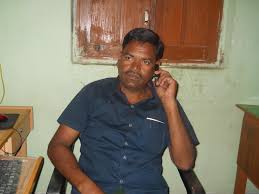Indradev Yadav, also known as Akhilesh Pratap Yadav, was shot dead near his home in Chatra on 12 May 2016. That evening he received a phone call inviting him to meet someone nearby. As he reached Chatra bypass a number of unidentified assailants opened fire on him, hitting him twice. He died at the scene around 9pm.
Yadav, 35, was originally from Barachatti village in Bihar. He had been working in various media organisations for the last 10 years and was currently employed as a correspondent for Taaza TV, a Hindi news channel based in Kolkata. Yadav was known as a fearless journalist and defender of Human Rights. Over the course of his career he had exposed many cases of corruption in the implementation of government schemes in the region. According to sources he was reporting on the financial mismanagement of a pond building scheme for nearby villages at the time of his death.
Yadav is survived by his wife and their two children. The human rights organisation HDR-Alert India have urged that a thorough investigation is launched into the murder and that the state government does its upmost to protect the right to free expression and the lives of all human rights defenders. The International Federation of Journalists notes that since 1990, 97 journalists and media workers have been killed in India, making it the seventh deadliest country for media globally.
